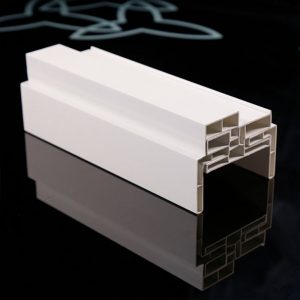
1. Design Chameleon
Laminated UPVC doesn’t adapt to styles – it absorbs them:
– Historical Mimicry: 3D-printed grain patterns replicate 18th-century oak with 0.1mm accuracy for heritage projects
– Futuristic Flair: Magnetron-sputtered metallic finishes achieve spaceship-worthy aesthetics
– Custom Branding: Digital UV printing embeds corporate logos or architectural patterns directly into profiles
2. Performance That Follows Function
The same profile transforms for different missions:
– Hurricane Zones: Fiber-reinforced versions pass Miami-Dade 180mph wind tests
– Arctic Conditions: Low-temperature formulations remain flexible at -50°C (Russian Arctic trials)
– Sterile Environments: Antimicrobial laminates for hospitals meet ISO 22196 standards
3. The Installation Revolution
UPVC’s secret weapon? Adaptable engineering:
– Modular Clip Systems: Convert windows to curtain walls in hours
– Thermal Expansion Magic: 0.07mm/m·K movement accommodates desert-to-tundra temperature swings
– Weight Advantage: 1/3 the mass of aluminum enables retrofits without structural reinforcement
4. Commercial Game-Changer
While residential use is familiar, laminated UPVC shines in unexpected places:
– Data Centers: Static-dissipative grades protect sensitive equipment
– Transit Hubs: Vandal-resistant formulations withstand 500J impacts
– Clean Rooms: Electrostatic coatings repel particulate matter
Pro Tip: For mixed-use projects, specify “Zone-Tailored” profiles – different laminates for street-level (impact-resistant) versus upper floors (lightweight).
The Future of Adaptability
Emerging technologies will soon enable:
– Phase-Change Laminates: Switching between transparent and opaque
– Self-Powered Profiles: Embedded piezoelectric layers harvesting wind energy
– AI-Optimized Designs: Algorithm-generated profiles matching local stress maps
This isn’t just material versatility – it’s architectural alchemy, turning one base material into whatever a project demands. Because in modern construction, the most powerful material isn’t the strongest or the cheapest – it’s the one that becomes exactly what you need, when you need it.
(Ideal for: Architects tired of compromise, developers juggling multiple site requirements, and contractors who value one-system solutions.)






